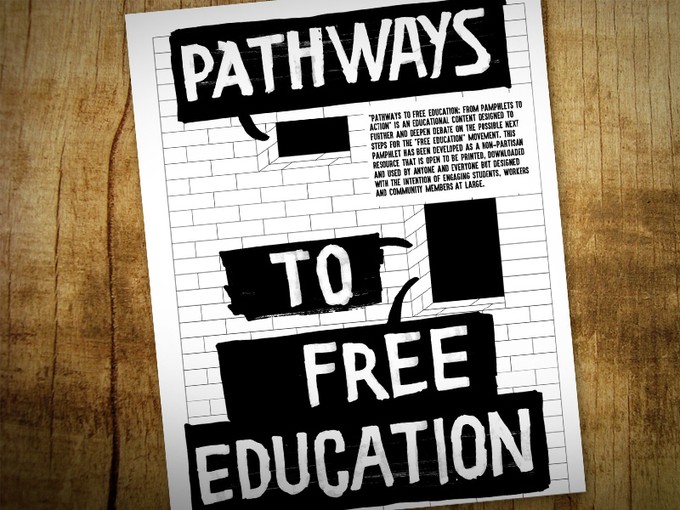Pathways to free education
Shutdowns and popular uprisings are not the most effective way to move forward
The conversations about free education launched by the #FeesMustFall student protests of 2015 have become increasingly disjointed. Partisan politics, the careerist opportunism of some student leaders, violence used by the state and universities against students and allies of the free education movement, have slowed the momentum of 2015.
Increasingly, students in universities realise that the struggle for Free Decolonised Education will not be effectively carried out with shutdowns and popular uprisings. Coalitions with community members and connecting their struggles are increasingly seen as important.
The Pathways to Free Education pamphlet is an attempt to grapple with these questions and to rejuvenate political participation, particularly from young citizenry.
Launched in July in Cape Town, this 26-page booklet contains interviews, essays, poetry and articles on free education from students, academics and professors from South Africa and abroad, high school learners and workers. There are insightful perspectives on a range of issues from how to make free education possible from an economic standpoint, to the politics of free education as it relates to different classes and income groups. There are words of advice and encouragement to student activists from the older generation and also messages of solidarity from Brazil and Ghana..
This collection of narratives and views (as far as possible in basic and easily understood English, with contributions in isiXhosa and Afrikaans) is intended to continue the conversation around free education, to involve all parties and to include them in the conversation.
The demand for free education has not included the voices of learners, workers, parents and households of students directly affected by the gross commodification of education. This cannot be allowed to happen again. It is important to get everyone on the same page to talk about around free education and the ways in which it can be realised.
Such an initiative would encourage civil society to take action around these issues and re-ignite the Free Education Movement and many other struggles. The Finance Minister has said at a Cape Chamber Debate that free education for the poor is easily possible. Therefore with effort and determination, Free Decolonised Education for all can become a reality.
How do students in tertiary institutions located in relative positions of privilege as a result of their upward mobility and ability to access elite university spaces, begin to go and ask for help from communities and high school learners whose ambition is to be a university student, without coming across as entitled or simply looking to have an easy time? Most learners in our education system face huge challenges from inadequate facilities or resources to the shortage of dedicated teaching staff. Their high school experience is a struggle, and what makes it worthwhile is the hope of the university as the ticket out of poverty.
At the launch of the pamphlet, where the collective hosted a debate, Neliswa Qaqane, a grade 11 pupil at Gugulethu Comprehensive High, outlined the challenges high school learners face: not enough textbooks; poor teaching; lack of access to past papers for practice; no libraries or access to computers; having to buy their own study materials; having to write matric exams in either English or Afrikaans. To laughter from the audience, she asked: “How do you begin telling teachers who are your elders that they are terrible at their job?”
We should all be upset with ourselves that these are burdens we’ve come to expect many young people to carry.
Neliswa went on to explain why, despite their own challenges, the fees struggle as it unfolded was important for learners and how it linked to their present reality. As if meeting admission requirements to university isn’t difficult enough in environments which don’t nurture the academic ‘excellence’ required for entry, there is also the challenge of expensive tuition fees. It is easy to see why students ask: If I can’t even get these marks, meaning I can’t get bursary or funding, then why should I continue with this high school struggle now?
To the university students at the launch, these experiences were familiar, and many recounted ‘overcoming’ similar challenges. Perhaps one day we will all have to forgive ourselves for allowing this resilience to be an expected norm in society as opposed to being the exception to the rule. Meanwhile we can at least begin by questioning the narrative of education as a personal good, a ticket to the good life. Some of the university students expressed regret for not going back into the communities they came from and helping the learners there with the challenges they faced.
This does happen, through various progressive organisations such as Ubunye, a student-led development agency operating across township high schools in Cape Town. But the point of this initiative isn’t to create another charitable project, but rather to recognise the similarity of struggles across multiple sites and to work on ways to connect those struggles.
Views expressed are not necessarily those of GroundUp.
Support independent journalism
Donate using Payfast

Don't miss out on the latest news
We respect your privacy, and promise we won't spam you.
Next: Sans Souci schoolgirls protest against alleged racist school policies
Previous: An inconvenient person: Remembering Dulcie September
© 2016 GroundUp. 
This article is licensed under a Creative Commons Attribution-NoDerivatives 4.0 International License.
You may republish this article, so long as you credit the authors and GroundUp, and do not change the text. Please include a link back to the original article.

